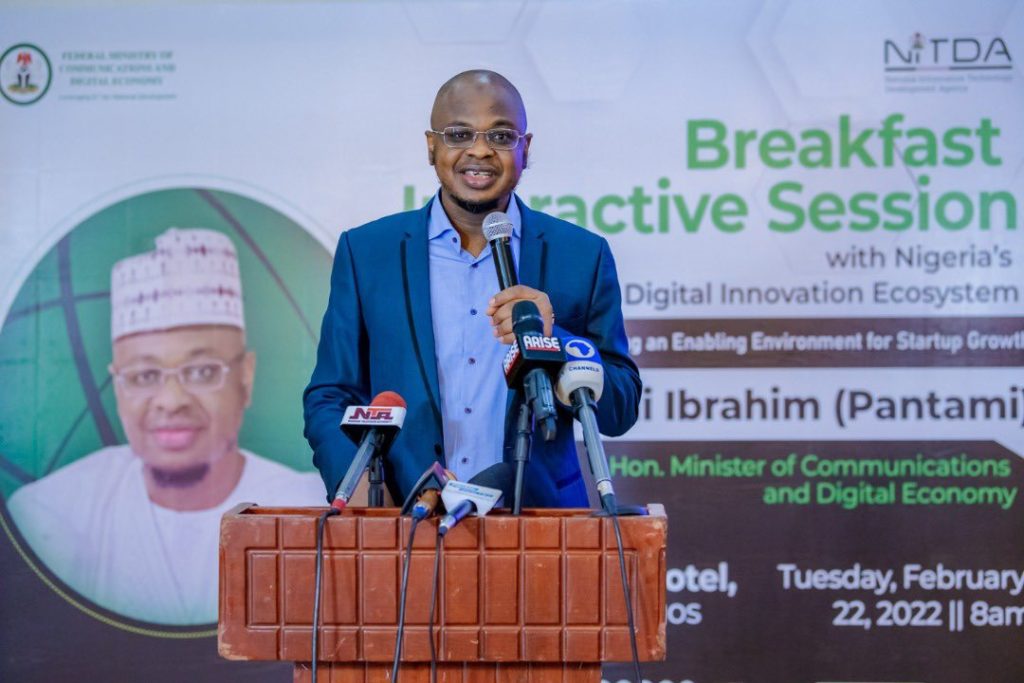Nigerian president Muhammadu Buhari has now approved the Nigeria Startup Bill to be passed to the National Assembly. This is revealed by Nigerian Minister of Communications and Digital Economy, Isa Ali Pantami on Tuesday at a Breakfast Interactive Session held at Oriental Hotel, Lagos.
This is happening after about a year since the Nigeria Startup Bill—a coalition of efforts to create an enabling regulatory environment for the burgeoning startup ecosystem—was announced.
The initiative is led by the Nigerian presidency, in collaboration with 30 tech leaders including Ventures Platform founder Kola Aina and Future Africa founder Iyin Aboyeji, NITDA officials and the Minister of Digital Economy Isa Pantami.
The Tuesday event, whose theme was Fostering an Enabling Environment for Startup Growth, was originally meant for the minister and other public stakeholders to meet with the private ecosystem players to deliberate on ways to ensure a seamless implementation of the bill. It was an open space where anyone could ask questions and make suggestions.
The conversation started on a rather apprehensive note but as time went on, less confrontational questions were asked and critical suggestions were made.
Speaking on the recently signed startup bill, the minister mentioned six pillars that will support the implementation as the council move forward: First, understanding of the market; Second ecosystem consolidation, which is to create a united front in the startup ecosystem;

The third one is building the ecosystem; networking within and outside the ecosystem to foster growth is the fourth; the fifth is collaborating with the government; the minister urged the private sector to be deliberate in working with the governmental bodies. And lastly, honesty; Pantami urged all the stakeholders to do honest work.
Pantami mentioned that the presidency is ready to make sure the bill meets excellent execution. He commended, “the work of the startup ecosystem for pushing Nigeria to become the largest digital economy in Africa and it’s time to work closely together to achieve greater hallmark.”
There were questions and suggestions about how the government can make data affordable for Nigerians and create a hub where people can go to build at a subsidized cost or for free. The attendees also suggested that for the bill to be a success the government must involve people who have first-hand experience about each sector. For instance, how do you want to make a payment policy in Nigeria without involving Paystack and Flutterwave? How do you want to make policy in edutech without involving the ULessons and other players?
The government must start involving industry players in making policies that are likely going to affect the industry. The minister agreed to this.
In response to involving members of the ecosystem, Oswald Osaretin Guobadia, NSB Lead and Senior Special Assistant to the President on Digital Transformation said that the NSB has a big tent approach as one of its key pillars. “The big tent approach speaks to collaboration of all stakeholders in the digital economy ecosystem. We believe firmly that the ecosystem is comprised primarily of practitioners and policy and that both are equally essential to the growth of the ecosystem. A tent has no doors so it fundamentally welcomes all stakeholders to come add value and hold up the tent,” Guobadia said.
“In the light of this, the NSB has several focus groups with members of the ecosystem across different sectors including late-stage startups, early-stage startups, investors, academia etc. We’ve held events, townhalls and also have WhatsApp groups that cater to these groups. Everyone is truly welcome,” he added.





















